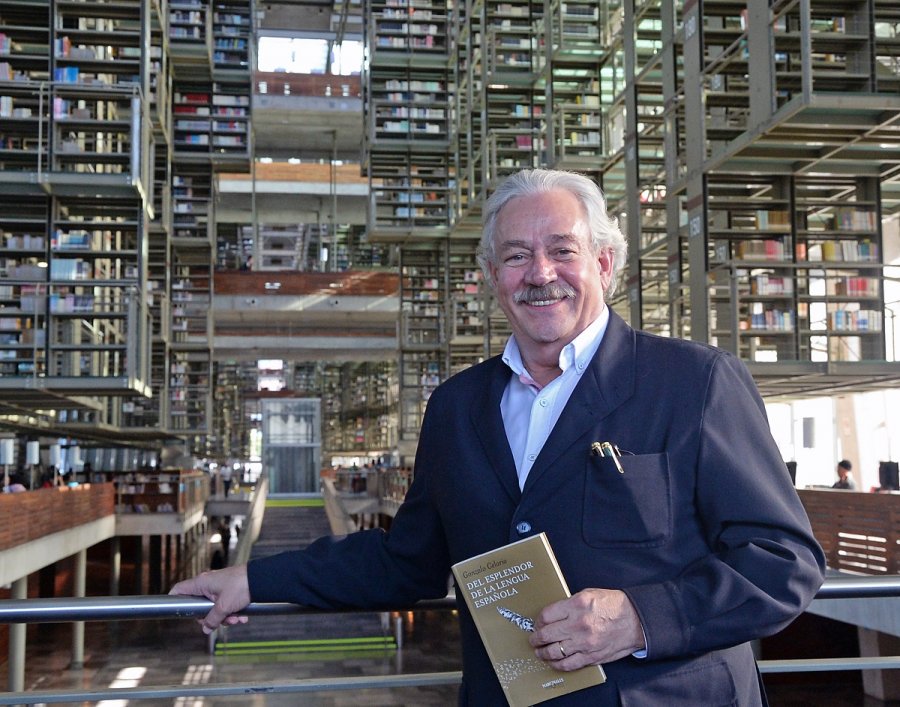Noticias
At Biblioteca Vasconcelos
Gonzalo Celorio presented his book Del esplendor de la lengua española
April 21, 2017In the presentation of his book Del esplendor de la lengua española, the chronicler, essayist and narrator Gonzalo Celorio (Mexico City, March 25th, 1948), referred to the work of language academies and the richness of the Spanish language .
The title, evokes the motto of the Real Academia Española: “Limpia, fija y da splendor” (It cleans, it fixes and it casts splendor), a motto the academies of America inherited but somehow the spirit has been modified although its form is preserved, the member of the National System of Art Creators of Fonca, explained.
"This motto is understood in an encyclopedic and erudite context of the Enlightenment. Evidently things have changed, it is true that sister academies of the Real Academia Española continue to clean and fix but with different criteria from those used in the eighteenth century”, the member of the Mexican Academy of Language, said.
A first criterion, the writer explained to the attendees gathered in the Mezzanine of Biblioteca Vasconcelos, is to be clear that the speaker is the true owner of the language, not the academics. "The Academia does not say how the language should be used, what it says is how the speakers use it. The institution restricts itself to describing and recording how that language is used”.
Accompanied by Daniel Goldin, campus director, Gonzalo Celorio pointed out that the Academia has given preponderance to what has been named as: the cultured norm, which presents a greater capacity for abstraction, a broader and more restricted code.
"The greater the knowledge, the language has a more homogeneous use. There was not an intelligibility problem between Alfonso Reyes from Mexico, Jorge Luis Borges from Argentina, or Dámaso Alonso from Spain, because they spoke Spanish in a very similar way, whereas in the popular classes the variations are bigger ".
He reiterated that the Academia has no longer an eighteenth century purist attitude. "The Academia does not clean, it simply recognizes the forms of speech, it records them in its great works. Nor does it set them in a strict sense because there is nothing more changing, more alive, more susceptible to daily change than the language”.
For the author, the language is a living organism that, if it were fixed, we would speak of a dead language. "If it could have the possibility of being fixed by some institution, we would be speaking Latin, not Spanish”, he said.
He also mentioned that the sense of fixation has changed over time, but not the splendor since the specialists of different disciplines participate in academic institutions whose writings and contributions give richness and breadth to the Spanish language.
Gonzalo Celorio emphasized that his book Del esplendor de la lengua española is a journey through the history of Mexican literature and the Spanish language used by remarkable Mexican writers.
"This book is a compilation of texts that I have written over 20 years. Something that unites them is that the authors of whom I speak were interrelated with the academy and expressed their love for the word ".
The author said that the articles contained in the volume edited by Tusquets were written in a circumstantial way, since some were made in occasion of celebrating centenaries, ephemeris or for the commemoration of mournful anniversaries.
Finally the specialist in Spanish American literature emphasized that the Spanish language is the mother tongue of international communication with the largest number of speakers in the world: 500 million.
"It is fantastic that this language that is spoken in such a vast territory still has conditions of intelligibility that the academic institution has contributed significantly”.
"A language is great if it has unity but it is also important that it has a proportional controlled degree of diversity, the fact that we all speak the same language would take away much of its grace”, he said.
Del esplendor de la lengua española, brings together texts in the genres of novel, poetry, chronicle, essay, journalistic article, linguistics, philology and history on Artemio de Valle-Arizpe, Salvador Novo, Alfonso Reyes, Andrés Henestrosa, Carlos Fuentes, Rosa Beltrán , Edmundo O'Gorman, José Luis Martínez, Antonio Alatorre, Margit Frenk, Rubén Bonifaz Nuño.
Hugo Gutiérrez Vega, José Rogelio Álvarez, José G. Moreno de Alba, Miguel Ángel Granados Chapa, Roger Bartra, Carlos Prieto, Eulalio Ferrer, Augusto Monterroso, Dulce María Loynaz and Víctor García de la Concha, are authors who have contributed with their works to give the Spanish language the brilliance and nobility that distinguish it.
Mexico,Distrito Federal
